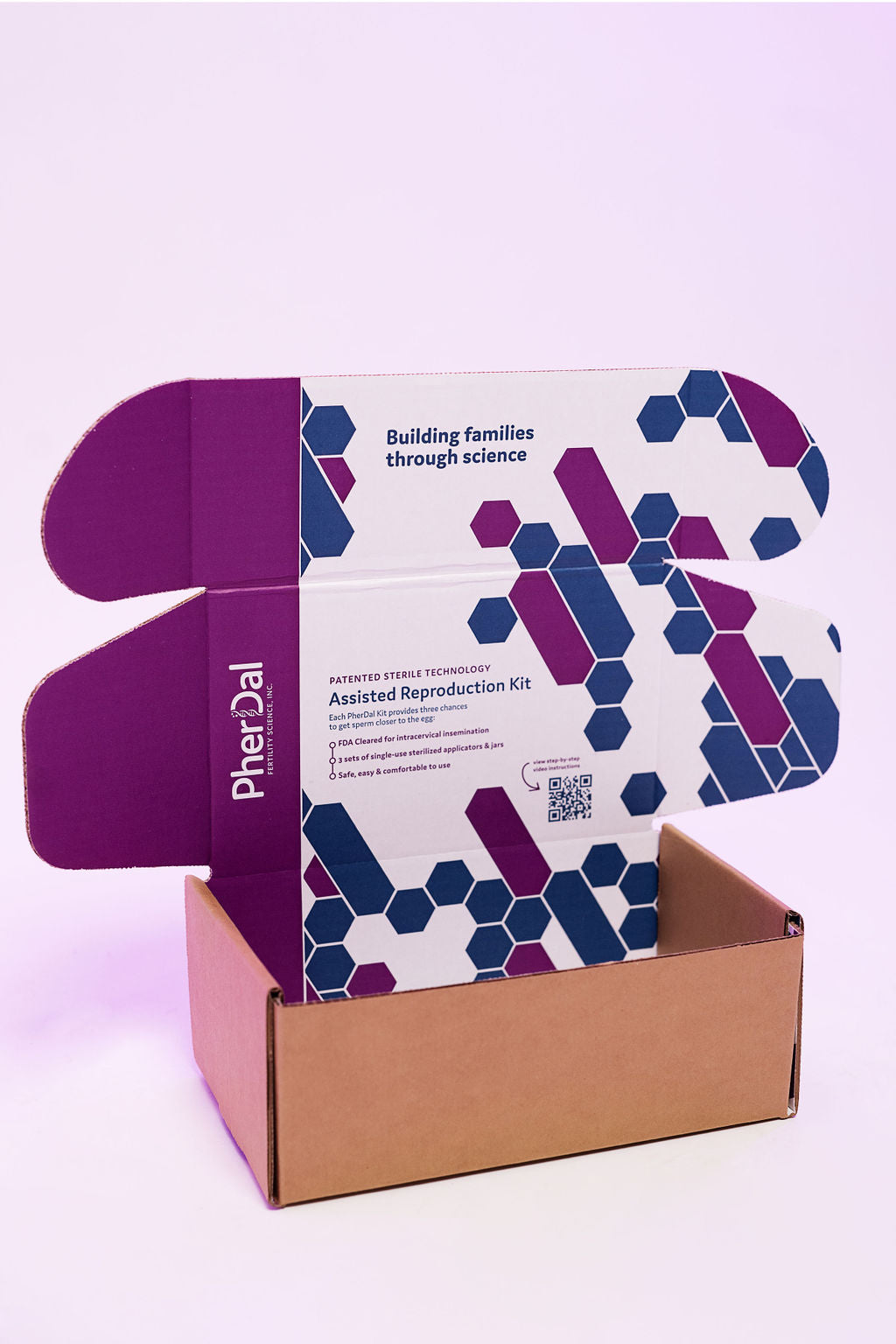Spontaneous moments of intimacy may be a distant memory if you've been trying to conceive for a while. A memory swiftly replaced with ovulation tracking and impeccably timed rendezvous akin to a military mission.
But just how accurate is ovulation tracking?
Several methods are available for tracking ovulation, and there's no doubt it can be a useful tool in achieving your dreams of a successful pregnancy. First, however, it's essential to understand the limitations of each method and the factors that may influence the accuracy of the results.
We'll break it down for you here so you can choose the right option for your unique needs…and maybe get back to having some fun in the bedroom!
Types of Ovulation Tracking
Timing is CRUCIAL when you are trying to conceive. Those precious sperm sadly have a short life expectancy, and they need to be there ready and willing when your egg is released from the ovary.
Ovulation tracking assists in identifying a woman's fertile window by monitoring various physiological changes that occur during the menstrual cycle. You may experience physical signs of ovulation, such as increased cervical mucus, but this isn't always obvious or consistent for every woman, which is why there are many other tracking methods.
Transvaginal Ultrasound
During a normal menstrual cycle, a follicle within the ovary will grow until it ruptures and releases the egg into the fallopian tube. Transvaginal ultrasound is a technique used to monitor the growth of the follicle to more accurately predict ovulation and a woman's fertile window resulting in an increased chance of conception.
Although the procedure should not be painful, some women may find the process uncomfortable or invasive as it involves the insertion of the transvaginal probe into the vagina.
Follicle tracking by transvaginal ultrasound is more commonly used during in vitro fertilization (IVF).
Urinary Hormone Detection
Most over-the-counter ovulation prediction kits work by detecting changes in the level of luteinizing hormone (LH) in the urine as ovulation approaches. This hormone is secreted by the pituitary gland and stimulates the process of ovulation.
Ovulation usually takes place 12 to 36 hours after the LH surge has occurred. Therefore, you should begin testing in the days before ovulation is expected. The urinary level of LH should be visibly stronger on the testing strip as the hormone surges toward its peak, signaling that your fertile window is approaching.
Urinary ovulation detection kits are easily accessible and can help you identify your fertile window for an increased chance of conception.
Basal Body Temperature
Your basal body temperature (BBT) is your internal temperature when you first wake up in the morning. Ovulation triggers increased hormone progesterone levels, which causes a rise in body temperature. If you chart your temperature throughout your menstrual cycle, you should see that it is typically lower before ovulation and higher after ovulation has occurred.
Although monitoring your BBT only gives you a retrospective estimate of ovulation, if you track your cycle over several months, you may be able to determine a pattern and successfully time intercourse or insemination in your fertile window.
Factors That Influence Accuracy
Fertility is complex, and many factors may impact how accurate ovulation tracking can be. Both internal physiological and external environmental factors can make tracking ovulation challenging.
Basal Body Temperature Fluctuations
Accurate testing of your BBT can be difficult. You must take your temperature at the same time every day under the same conditions to get an accurate trend to follow. The reality is, it's almost impossible to accurately measure while awake.
It must be measured while you’re at rest. Even by sitting up you’re altering the results. The BBT fluctuates only a few tenths of degree making it very easy to miss. In addition, BBT can be influenced by many other factors, such as:
-
Illness or fever
-
Stress
-
Shift work
-
Interrupted sleep cycles or oversleeping
-
Alcohol
-
Travel and time zone differences
-
Gynecological disorders
-
Certain medications
An alternative may be LH testing. You can do this multiple times a day to make sure you catch your surge. Or, invest in technology. The new apple watch tests your BBT while sleeping. Since it's retrospective, it is best used (IMO) as a secondary confirmation test.
Cycle Regularity
Hands up if you were told that the menstrual cycle is 28 days long and ovulation occurs on day 14. Oh, if only it were that simple! A recent study of over 600,000 women showed that only 13% of women had a cycle length of 28 days. Furthermore, the results revealed that ovulation did not occur consistently on day 14, with the luteal phase varying in cycles.
Every woman is different, and even your unique cycle will vary in regularity.
Factors That Influence Cycle Regularity
Your menstrual cycle is like an orchestra…the instruments must be tuned and working together for the music to be in harmony. Even minor environmental disturbances in your microbiome can wreak havoc on this delicate system, let alone factors such as hormonal imbalances, medical conditions, and, ironically, stress. I say ironically because it can be one of the most stressful times of your life if you are struggling with infertility.
Getting Off Birth Control
Your cycle may be irregular when you first come off the pill, as it contains hormones that prevent ovulation each month. Therefore, you should allow up to 3 months for your natural cycle to fully re-establish itself. If your cycles do not resume after several months, seek the advice of a medical professional.
Stress Levels
The hypothalamus is the part of the brain that controls your menstrual cycle. It works in conjunction with the pituitary gland to release the period-inducing hormones estrogen and progesterone.
When your body is under stress from external factors such as lack of sleep, family problems, or work drama, it produces a hormone called cortisol. This hormone can disrupt the interaction between the hypothalamus, pituitary, and ovaries resulting in irregular periods.
Medical Conditions
Many medical conditions can be responsible for disturbing the menstrual cycle, including:
-
Polycystic ovary syndrome (PCOS) – This is a hormonal disorder that impacts a woman's ability to ovulate regularly.
-
Endometriosis – This is a condition where the tissue that usually lines the uterus grows in other areas of the pelvis, such as the ovaries, fallopian tubes, and in severe cases, the bowel.
-
Thyroid conditions – 1 in 8 women will develop a thyroid issue during their lifetime, and up to 60% of those with thyroid abnormalities are unaware of their condition.
-
Eating disorders or excessive exercising - Conditions such as anorexia nervosa, bulimia, or obsessive and extreme exercising can impair cycle regularity.
-
Premature ovarian failure – This is the loss of normal ovarian function before age 40. Women with premature ovarian failure might have irregular or occasional periods for years.
-
Pelvic inflammatory disease (PID) – This is an infection of the reproductive organs that can cause irregular menstrual bleeding and infertility.
If you think an underlying medical condition may be impacting your fertility, speak to your OB/GYN about a referral to a reproductive endocrinologist.
Start Tracking Your Ovulation Today
So, how accurate is ovulation tracking? The answer is… it's complicated!
That said, ovulation tracking can provide valuable information and insight into your menstrual cycle. Knowledge is power—the more data you and your doctor have, the better, so start tracking as soon as possible.
I wish I had known all this information on day one of trying to conceive instead of what felt like months of not understanding my own body. That's why I created the PherDal Ovulation Journal so you can skip the confusion, learn about your own body and hopefully experience the sheer joy and relief of that positive pregnancy test!
No matter what stage you are at in your journey toward conception, PherDal is here to support you.




